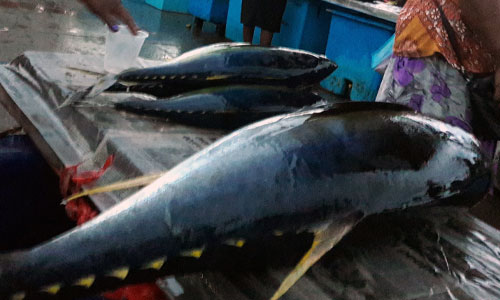The Micronesian fisheries reform initiative stands as a model of how small island nations can reclaim agency over their natural resources. By combining legal reform, economic planning, and strategic partnerships, FSM has taken a decisive step toward building a sovereign, sustainable, and inclusive fishing industry.
— Micronesia —
sovereignty. transformation. resilience.








Reclaiming the Blue Economy: Strategic Reform of the Micronesian Tuna Industry
“A nation that owns the sea must also own the means to benefit from it.”
— Shaan Stevens, Legal and Commercial Advisor, GG International
Challenge
The Federated States of Micronesia (FSM), home to one of the largest and most biologically productive Exclusive Economic Zones (EEZs) in the Pacific, has long been a silent giant in the global tuna supply chain. For decades, its waters were exploited under foreign fishing access agreements, generating modest licensing fees while leaving value-added processing, employment, and industry development largely offshore.
In 1998, recognizing the urgent need to reverse this imbalance, the Government of FSM—supported by the Asian Development Bank—commissioned GG International to conduct a strategic review of the national fishing industry. The goal: develop a new commercial and regulatory framework to enable local ownership, attract investment, and unlock the full economic and employment potential of FSM’s marine wealth.
This project built on earlier steps taken in 1990 with the formation of the Caroline Fishing Company—a state-owned enterprise jointly held by the State of Pohnpei, the FSM National Fisheries Corporation (NFC), and a private Australian partner. The company marked FSM’s first major move toward securing a long-term national stake in tuna harvesting and processing, but a broader policy shift was still required to catalyze sector-wide transformation.
Strategy
GG International delivered an integrated legal, commercial, and policy strategy to support FSM’s fisheries reform agenda. The key activities included:
- A detailed review of the regulatory and economic environment governing tuna harvesting and processing, with an emphasis on private sector engagement.
- Development of tailored economic models assessing various public-private partnership options, considering capital flows, value-addition potential, and sustainability risks.
- Legal and institutional analysis, including proposals for legislative reform to facilitate SOE privatization and investor participation.
- Asset valuation of existing government-owned fisheries infrastructure and drafting of a transparent divestment framework.
- Advisory on new enterprise structuring, governance, and capital formation, aligned with local employment and development objectives.
- Stakeholder consultations with ministries, regulators, and development partners to align political and technical consensus.
- Capacity building for fisheries officials, economic planners, and legal drafters to strengthen domestic institutional oversight.
- Policy design to maximize local employment, support onshore processing, and develop integrated supply chains within FSM.
Transformation
The project delivered far-reaching reform recommendations that laid the groundwork for a new era of fisheries governance in FSM. The transformation was underpinned by a policy architecture rooted in economic sovereignty, sustainability, and inclusive growth.
- Economic Sovereignty and Value Capture: FSM began shifting from passive access agreements to active domestic participation in harvesting and processing. This allowed the nation to retain greater revenues from its EEZ and shape the trajectory of its own blue economy.
- Capacity Building and Technology Transfer: The joint venture model accelerated technology adoption, workforce training, and operational expertise through partnerships with experienced international operators. This nurtured local capability and increased FSM nationals' participation in the sector.
- Strategic National Development: By elevating fisheries as a national development pillar, FSM was able to pursue diversified economic strategies, enhance food security, and attract investment in essential logistics and cold-chain infrastructure.
- Regional Tuna Management Influence: FSM’s increased commercial presence empowered it to take a stronger voice in regional forums like the Western and Central Pacific Fisheries Commission (WCPFC), advocating for equitable quota allocations and stronger sustainability commitments.
- Risk Sharing through Public-Private Partnership: The restructured industry model effectively distributed investment and operational risks between the government and private sector, ensuring long-term viability without overburdening the state’s fiscal capacity.